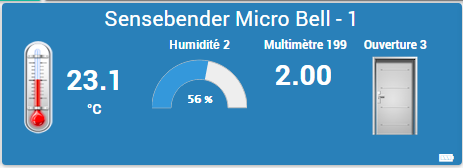Sensebender Micro + button
-
Hello all !
I like the way that this sketch: https://www.mysensors.org/hardware/micro work with Jeedom.
And I need a bell button that doesn't need a batterie per month.
So i've tried to mix with this sketch: https://www.mysensors.org/build/binary
But it's a fail. It only show the data once.The button is in D3. I may use D4 latter (as a secret button maybe). By using D3, we can use the ftdi port to power the circuit, and to cable the button. But then, i want to see how many time a button-cell can be used.
so:
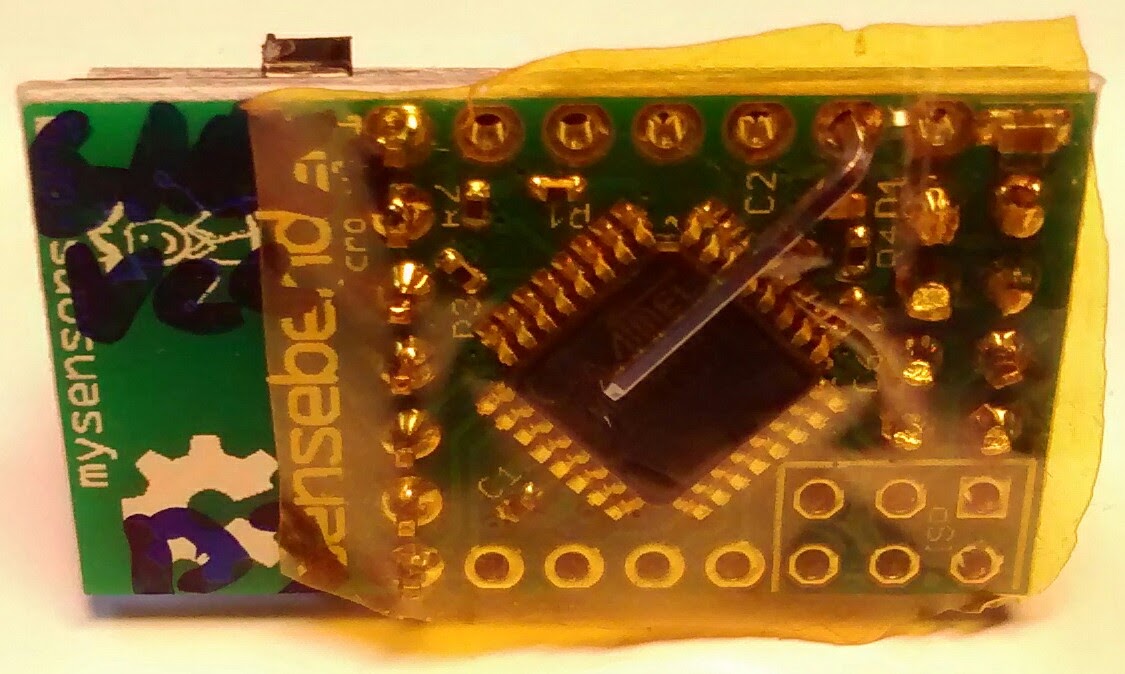
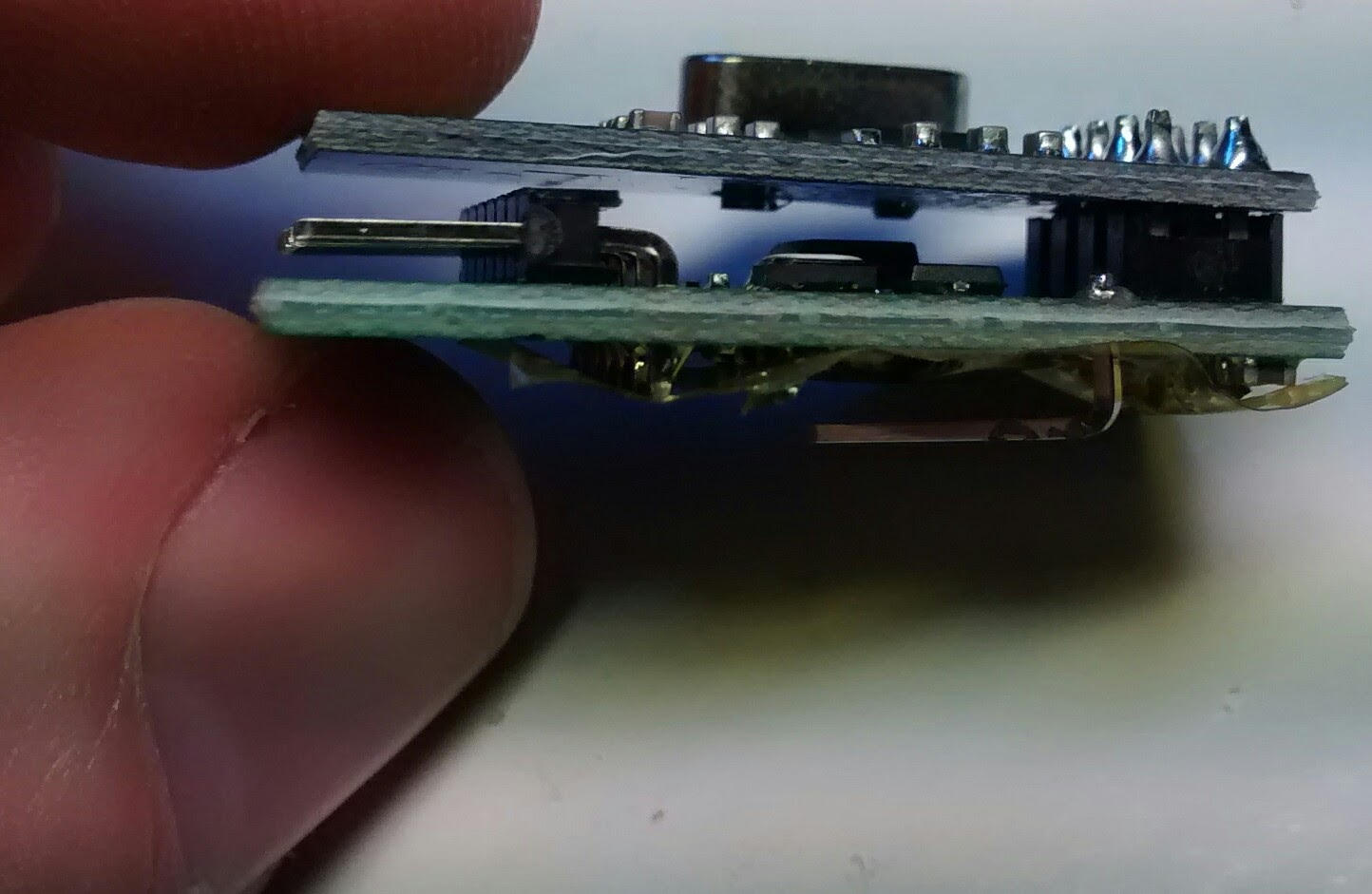
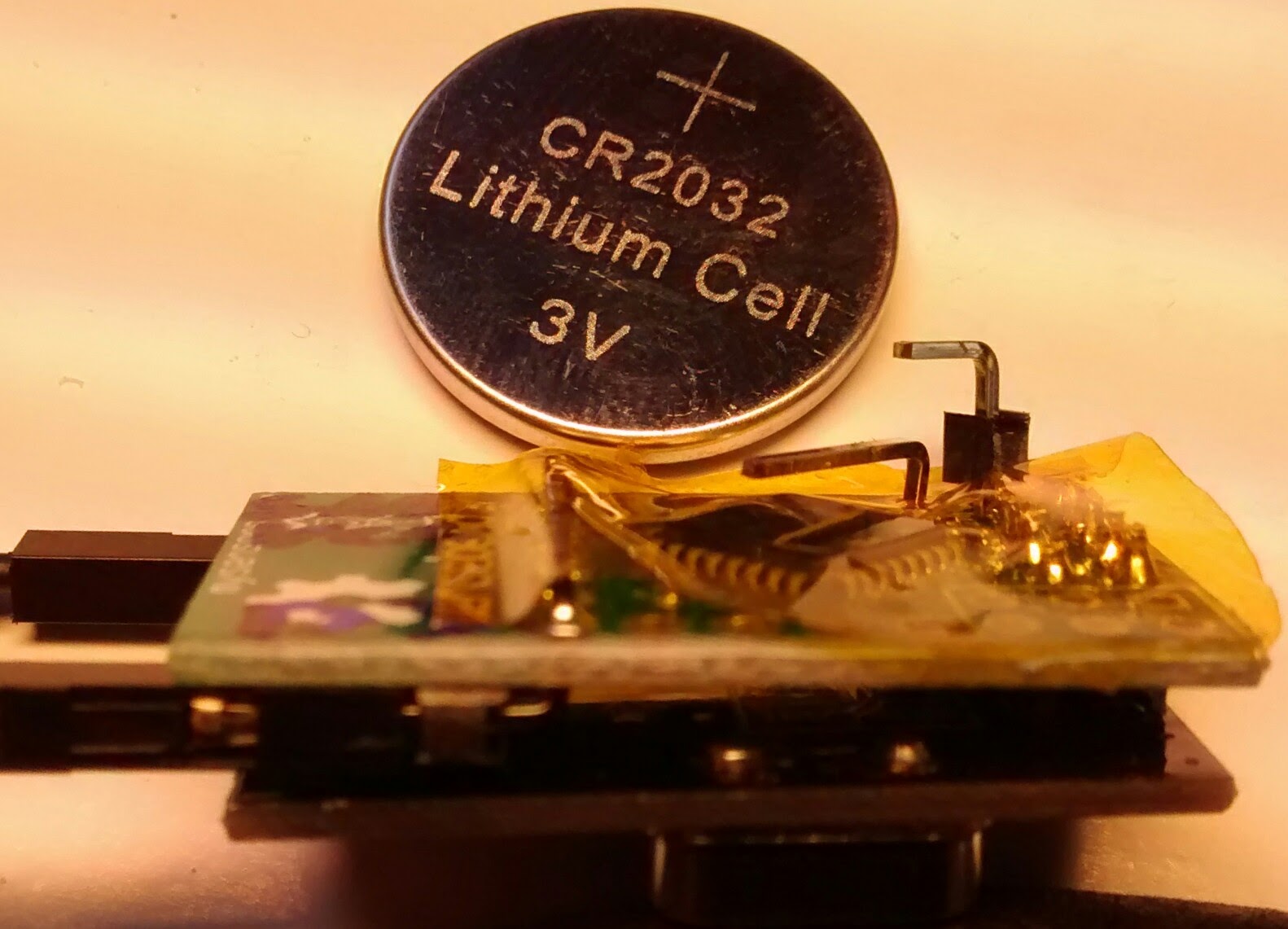
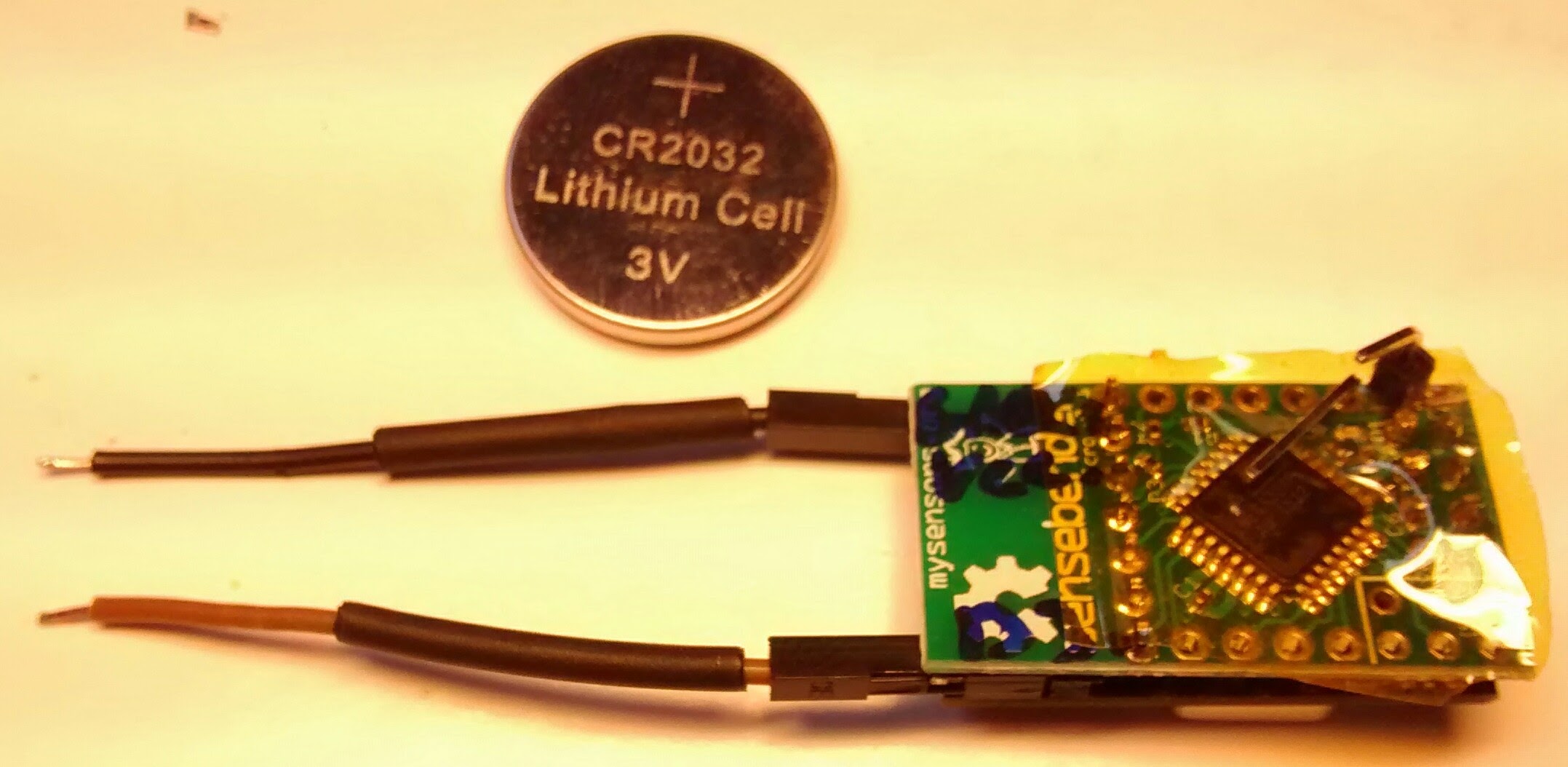
How to use the interrupt fonction to wake up when pressing the button, and have a 10 minutes wake-up if no press ?
(And yeah, i could take off all the serial part)Thanks for helping !
ps: can't we write down the code ? It may be a bug from the forum but i can't go down...
/** * The MySensors Arduino library handles the wireless radio link and protocol * between your home built sensors/actuators and HA controller of choice. * The sensors forms a self healing radio network with optional repeaters. Each * repeater and gateway builds a routing tables in EEPROM which keeps track of the * network topology allowing messages to be routed to nodes. * * Created by Henrik Ekblad <henrik.ekblad@mysensors.org> * Copyright (C) 2013-2015 Sensnology AB * Full contributor list: https://github.com/mysensors/Arduino/graphs/contributors * * Documentation: http://www.mysensors.org * Support Forum: http://forum.mysensors.org * * This program is free software; you can redistribute it and/or * modify it under the terms of the GNU General Public License * version 2 as published by the Free Software Foundation. * ******************************* * * REVISION HISTORY * Version 1.0 - Henrik Ekblad * * DESCRIPTION * Default sensor sketch for Sensebender Micro module * Act as a temperature / humidity sensor by default. * * If A0 is held low while powering on, it will enter testmode, which verifies all on-board peripherals * * Battery voltage is as battery percentage (Internal message), and optionally as a sensor value (See defines below) * */ #include <MySensor.h> #include <Wire.h> #include <SI7021.h> #include <SPI.h> #include "utility/SPIFlash.h" #include <EEPROM.h> #include <sha204_lib_return_codes.h> #include <sha204_library.h> #include <RunningAverage.h> #include <avr/power.h> #include <Bounce2.h> // Define a static node address, remove if you want auto address assignment //#define NODE_ADDRESS 3 // Uncomment the line below, to transmit battery voltage as a normal sensor value //#define BATT_SENSOR 199 #define RELEASE "1.2" #define AVERAGES 2 // Child sensor ID's #define CHILD_ID_TEMP 1 #define CHILD_ID_HUM 2 // How many milli seconds between each measurement #define MEASURE_INTERVAL 600000 // FORCE_TRANSMIT_INTERVAL, this number of times of wakeup, the sensor is forced to report all values to the controller #define FORCE_TRANSMIT_INTERVAL 30 // When MEASURE_INTERVAL is 60000 and FORCE_TRANSMIT_INTERVAL is 30, we force a transmission every 30 minutes. // Between the forced transmissions a tranmission will only occur if the measured value differs from the previous measurement // HUMI_TRANSMIT_THRESHOLD tells how much the humidity should have changed since last time it was transmitted. Likewise with // TEMP_TRANSMIT_THRESHOLD for temperature threshold. #define HUMI_TRANSMIT_THRESHOLD 1 #define TEMP_TRANSMIT_THRESHOLD 1 // Pin definitions #define TEST_PIN A0 #define LED_PIN A2 #define ATSHA204_PIN 17 // A3 #define CHILD_ID_BP 3 #define BUTTON_PIN 3 // Arduino Digital I/O pin for button/reed switch //#define CHILD_ID 4 //#define BUTTON_PIN 4 // Arduino Digital I/O pin for button/reed switch const int sha204Pin = ATSHA204_PIN; atsha204Class sha204(sha204Pin); SI7021 humiditySensor; SPIFlash flash(8, 0x1F65); MySensor gw; // Sensor messages MyMessage msgHum(CHILD_ID_HUM, V_HUM); MyMessage msgTemp(CHILD_ID_TEMP, V_TEMP); MyMessage msgBP(CHILD_ID_BP,V_TRIPPED); Bounce debouncer = Bounce(); int oldValue=-1; #ifdef BATT_SENSOR MyMessage msgBatt(BATT_SENSOR, V_VOLTAGE); #endif // Global settings int measureCount = 0; int sendBattery = 0; boolean isMetric = true; boolean highfreq = true; // Storage of old measurements float lastTemperature = -100; int lastHumidity = -100; long lastBattery = -100; RunningAverage raHum(AVERAGES); /**************************************************** * * Setup code * ****************************************************/ void setup() { pinMode(LED_PIN, OUTPUT); digitalWrite(LED_PIN, LOW); Serial.begin(115200); Serial.print(F("Sensebender Micro FW ")); Serial.print(RELEASE); Serial.flush(); // First check if we should boot into test mode pinMode(TEST_PIN,INPUT); digitalWrite(TEST_PIN, HIGH); // Enable pullup if (!digitalRead(TEST_PIN)) testMode(); // Make sure that ATSHA204 is not floating pinMode(ATSHA204_PIN, INPUT); digitalWrite(ATSHA204_PIN, HIGH); digitalWrite(TEST_PIN,LOW); digitalWrite(LED_PIN, HIGH); #ifdef NODE_ADDRESS gw.begin(NULL, NODE_ADDRESS, false); #else gw.begin(NULL,AUTO,false); #endif // Setup the button pinMode(BUTTON_PIN,INPUT); // Activate internal pull-up digitalWrite(BUTTON_PIN,HIGH); // After setting up the button, setup debouncer debouncer.attach(BUTTON_PIN); debouncer.interval(5); humiditySensor.begin(); digitalWrite(LED_PIN, LOW); Serial.flush(); Serial.println(F(" - Online!")); gw.sendSketchInfo("Sensebender Micro", RELEASE); gw.present(CHILD_ID_TEMP,S_TEMP); gw.present(CHILD_ID_HUM,S_HUM); // Register binary input sensor to gw (they will be created as child devices) gw.present(CHILD_ID_BP, S_DOOR); #ifdef BATT_SENSOR gw.present(BATT_SENSOR, S_POWER); #endif isMetric = gw.getConfig().isMetric; Serial.print(F("isMetric: ")); Serial.println(isMetric); raHum.clear(); sendTempHumidityMeasurements(false); sendBattLevel(false); } /*********************************************** * * Main loop function * ***********************************************/ void loop() { measureCount ++; sendBattery ++; bool forceTransmit = false; if ((measureCount == 5) && highfreq) { clock_prescale_set(clock_div_8); // Switch to 1Mhz for the reminder of the sketch, save power. highfreq = false; } if (measureCount > FORCE_TRANSMIT_INTERVAL) { // force a transmission forceTransmit = true; measureCount = 0; } gw.process(); sendTempHumidityMeasurements(forceTransmit); if (sendBattery > 60) { sendBattLevel(forceTransmit); // Not needed to send battery info that often sendBattery = 0; } // début du rajout { debouncer.update(); // Get the update value int value = debouncer.read(); if (value != oldValue) { // Send in the new value gw.send(msgBP.set(value==HIGH ? 1 : 0)); oldValue = value; } } // fin du rajout gw.sleep(MEASURE_INTERVAL); } /********************************************* * * Sends temperature and humidity from Si7021 sensor * * Parameters * - force : Forces transmission of a value (even if it's the same as previous measurement) * *********************************************/ void sendTempHumidityMeasurements(bool force) { bool tx = force; si7021_env data = humiditySensor.getHumidityAndTemperature(); float oldAvgHum = raHum.getAverage(); raHum.addValue(data.humidityPercent); float diffTemp = abs(lastTemperature - (isMetric ? data.celsiusHundredths : data.fahrenheitHundredths)/100); float diffHum = abs(oldAvgHum - raHum.getAverage()); Serial.print(F("TempDiff :"));Serial.println(diffTemp); Serial.print(F("HumDiff :"));Serial.println(diffHum); if (isnan(diffHum)) tx = true; if (diffTemp > TEMP_TRANSMIT_THRESHOLD) tx = true; if (diffHum >= HUMI_TRANSMIT_THRESHOLD) tx = true; if (tx) { measureCount = 0; float temperature = (isMetric ? data.celsiusHundredths : data.fahrenheitHundredths) / 100.0; int humidity = data.humidityPercent; Serial.print("T: ");Serial.println(temperature); Serial.print("H: ");Serial.println(humidity); gw.send(msgTemp.set(temperature,1)); gw.send(msgHum.set(humidity)); lastTemperature = temperature; lastHumidity = humidity; } } /******************************************** * * Sends battery information (battery percentage) * * Parameters * - force : Forces transmission of a value * *******************************************/ void sendBattLevel(bool force) { if (force) lastBattery = -1; long vcc = readVcc(); if (vcc != lastBattery) { lastBattery = vcc; #ifdef BATT_SENSOR gw.send(msgBatt.set(vcc)); #endif // Calculate percentage vcc = vcc - 1900; // subtract 1.9V from vcc, as this is the lowest voltage we will operate at long percent = vcc / 14.0; gw.sendBatteryLevel(percent); } } /******************************************* * * Internal battery ADC measuring * *******************************************/ long readVcc() { // Read 1.1V reference against AVcc // set the reference to Vcc and the measurement to the internal 1.1V reference #if defined(__AVR_ATmega32U4__) || defined(__AVR_ATmega1280__) || defined(__AVR_ATmega2560__) ADMUX = _BV(REFS0) | _BV(MUX4) | _BV(MUX3) | _BV(MUX2) | _BV(MUX1); #elif defined (__AVR_ATtiny24__) || defined(__AVR_ATtiny44__) || defined(__AVR_ATtiny84__) ADMUX = _BV(MUX5) | _BV(MUX0); #elif defined (__AVR_ATtiny25__) || defined(__AVR_ATtiny45__) || defined(__AVR_ATtiny85__) ADcdMUX = _BV(MUX3) | _BV(MUX2); #else ADMUX = _BV(REFS0) | _BV(MUX3) | _BV(MUX2) | _BV(MUX1); #endif delay(2); // Wait for Vref to settle ADCSRA |= _BV(ADSC); // Start conversion while (bit_is_set(ADCSRA,ADSC)); // measuring uint8_t low = ADCL; // must read ADCL first - it then locks ADCH uint8_t high = ADCH; // unlocks both long result = (high<<8) | low; result = 1125300L / result; // Calculate Vcc (in mV); 1125300 = 1.1*1023*1000 return result; // Vcc in millivolts } /**************************************************** * * Verify all peripherals, and signal via the LED if any problems. * ****************************************************/ void testMode() { uint8_t rx_buffer[SHA204_RSP_SIZE_MAX]; uint8_t ret_code; byte tests = 0; digitalWrite(LED_PIN, HIGH); // Turn on LED. Serial.println(F(" - TestMode")); Serial.println(F("Testing peripherals!")); Serial.flush(); Serial.print(F("-> SI7021 : ")); Serial.flush(); if (humiditySensor.begin()) { Serial.println(F("ok!")); tests ++; } else { Serial.println(F("failed!")); } Serial.flush(); Serial.print(F("-> Flash : ")); Serial.flush(); if (flash.initialize()) { Serial.println(F("ok!")); tests ++; } else { Serial.println(F("failed!")); } Serial.flush(); Serial.print(F("-> SHA204 : ")); ret_code = sha204.sha204c_wakeup(rx_buffer); Serial.flush(); if (ret_code != SHA204_SUCCESS) { Serial.print(F("Failed to wake device. Response: ")); Serial.println(ret_code, HEX); } Serial.flush(); if (ret_code == SHA204_SUCCESS) { ret_code = sha204.getSerialNumber(rx_buffer); if (ret_code != SHA204_SUCCESS) { Serial.print(F("Failed to obtain device serial number. Response: ")); Serial.println(ret_code, HEX); } else { Serial.print(F("Ok (serial : ")); for (int i=0; i<9; i++) { if (rx_buffer[i] < 0x10) { Serial.print('0'); // Because Serial.print does not 0-pad HEX } Serial.print(rx_buffer[i], HEX); } Serial.println(")"); tests ++; } } Serial.flush(); Serial.println(F("Test finished")); if (tests == 3) { Serial.println(F("Selftest ok!")); while (1) // Blink OK pattern! { digitalWrite(LED_PIN, HIGH); delay(200); digitalWrite(LED_PIN, LOW); delay(200); } } else { Serial.println(F("----> Selftest failed!")); while (1) // Blink FAILED pattern! Rappidly blinking.. { } } } -
Hi!
Regarding the scrolling not working while in edit, yeah, I experiencing that also. I'm on Chrome 47, Ubuntu. I always have to edit in full screen.
This is my sketch for a sensebender connected to my door bell:
2016-02-29: Updated sketch to fix bug in siVolt calculation and set max vcc to 3.2 V.
/** * The MySensors Arduino library handles the wireless radio link and protocol * between your home built sensors/actuators and HA controller of choice. * The sensors forms a self healing radio network with optional repeaters. Each * repeater and gateway builds a routing tables in EEPROM which keeps track of the * network topology allowing messages to be routed to nodes. * * Created by Henrik Ekblad <henrik.ekblad@mysensors.org> * Copyright (C) 2013-2015 Sensnology AB * Full contributor list: https://github.com/mysensors/Arduino/graphs/contributors * * Documentation: http://www.mysensors.org * Support Forum: http://forum.mysensors.org * * This program is free software; you can redistribute it and/or * modify it under the terms of the GNU General Public License * version 2 as published by the Free Software Foundation. * ******************************* * * REVISION HISTORY * Version 1.0 - Thomas Bowman Mørch * * DESCRIPTION * Default sensor sketch for Sensebender Micro module * Act as a temperature / humidity sensor by default. * * If A0 is held low while powering on, it will enter testmode, which verifies all on-board peripherals * * Battery voltage is as battery percentage (Internal message), and optionally as a sensor value (See defines below) * * * Version 1.3 - Thomas Bowman Mørch * Improved transmission logic, eliminating spurious transmissions (when temperatuere / humidity fluctuates 1 up and down between measurements) * * Added OTA boot mode, need to hold A1 low while applying power. (uses slightly more power as it's waiting for bootloader messages) * * MODIFIED by Martin Hjelmare * Sensebender Micro default sketch with addition of binary switch and interrupt, * taken from Patrick 'Anticimex' Fallberg's sketch BinarySwitchSleepSensor. * Also fixed the bug with the diff calculation for the temperature, and changed * vcc 100% rating to 3V, instead of 3.3V. */ #include <MySensor.h> #include <Wire.h> #include <SI7021.h> #include <SPI.h> #include "utility/SPIFlash.h" #include <EEPROM.h> #include <sha204_lib_return_codes.h> #include <sha204_library.h> #include <RunningAverage.h> //#include <avr/power.h> // Define a static node address, remove if you want auto address assignment #define NODE_ADDRESS 1 // Uncomment the line below, to transmit battery voltage as a normal sensor value #define BATT_SENSOR 199 #define RELEASE "1.3" #define AVERAGES 2 // Child sensor ID's #define CHILD_ID_TEMP 1 #define CHILD_ID_HUM 2 // How many milli seconds between each measurement #define MEASURE_INTERVAL 60000 // How many milli seconds should we wait for OTA? #define OTA_WAIT_PERIOD 300 // FORCE_TRANSMIT_INTERVAL, this number of times of wakeup, the sensor is forced to report all values to the controller #define FORCE_TRANSMIT_INTERVAL 30 // When MEASURE_INTERVAL is 60000 and FORCE_TRANSMIT_INTERVAL is 30, we force a transmission every 30 minutes. // Between the forced transmissions a tranmission will only occur if the measured value differs from the previous measurement // HUMI_TRANSMIT_THRESHOLD tells how much the humidity should have changed since last time it was transmitted. Likewise with // TEMP_TRANSMIT_THRESHOLD for temperature threshold. #define HUMI_TRANSMIT_THRESHOLD 0.5 #define TEMP_TRANSMIT_THRESHOLD 1.0 // Pin definitions #define TEST_PIN A0 #define OTA_ENABLE A1 #define LED_PIN A2 #define ATSHA204_PIN 17 // A3 const int sha204Pin = ATSHA204_PIN; atsha204Class sha204(sha204Pin); SI7021 humiditySensor; SPIFlash flash(8, 0x1F65); MySensor gw; // Sensor messages MyMessage msgHum(CHILD_ID_HUM, V_HUM); MyMessage msgTemp(CHILD_ID_TEMP, V_TEMP); #ifdef BATT_SENSOR MyMessage msgBatt(BATT_SENSOR, V_VOLTAGE); #endif #define CHILD_ID_BUTTON 3 #define BUTTON_PIN 3 // Arduino Digital I/O pin for button/reed switch #if (BUTTON_PIN < 2 || BUTTON_PIN > 3) #error BUTTON_PIN must be either 2 or 3 for interrupts to work #endif // Change to V_LIGHT if you use S_LIGHT in presentation below MyMessage msg(CHILD_ID_BUTTON, V_TRIPPED); // Global settings int measureCount = 0; int sendBattery = 0; boolean isMetric = true; boolean highfreq = true; boolean ota_enabled = false; boolean transmission_occured = false; // Storage of old measurements float lastTemperature = -100; int lastHumidity = -100; long lastBattery = -100; int oldValue = -1; RunningAverage raHum(AVERAGES); /**************************************************** * * Setup code * ****************************************************/ void setup() { pinMode(LED_PIN, OUTPUT); digitalWrite(LED_PIN, LOW); Serial.begin(115200); Serial.print(F("Sensebender Micro FW ")); Serial.print(RELEASE); Serial.flush(); // First check if we should boot into test mode pinMode(TEST_PIN,INPUT_PULLUP); //digitalWrite(TEST_PIN, HIGH); // Enable pullup if (!digitalRead(TEST_PIN)) testMode(); pinMode(OTA_ENABLE, INPUT); digitalWrite(OTA_ENABLE, HIGH); if (!digitalRead(OTA_ENABLE)) { ota_enabled = true; } // Make sure that ATSHA204 is not floating pinMode(ATSHA204_PIN, INPUT); digitalWrite(ATSHA204_PIN, HIGH); digitalWrite(TEST_PIN,LOW); digitalWrite(OTA_ENABLE, LOW); // remove pullup, save some power. // Setup the button pinMode(BUTTON_PIN, INPUT_PULLUP); digitalWrite(LED_PIN, HIGH); #ifdef NODE_ADDRESS gw.begin(NULL, NODE_ADDRESS, false); #else gw.begin(NULL,AUTO,false); #endif humiditySensor.begin(); digitalWrite(LED_PIN, LOW); Serial.flush(); Serial.println(F(" - Online!")); gw.sendSketchInfo("Sensebender Micro Bell", RELEASE); gw.present(CHILD_ID_TEMP,S_TEMP); gw.present(CHILD_ID_HUM,S_HUM); #ifdef BATT_SENSOR gw.present(BATT_SENSOR, S_MULTIMETER); #endif // Register binary input sensor to sensor_node (they will be created as child devices) // You can use S_DOOR, S_MOTION or S_LIGHT here depending on your usage. // If S_LIGHT is used, remember to update variable type you send in. See "msg" above. gw.present(CHILD_ID_BUTTON, S_DOOR); isMetric = gw.getConfig().isMetric; Serial.print(F("isMetric: ")); Serial.println(isMetric); raHum.clear(); sendTempHumidityMeasurements(false); sendBattLevel(false); if (ota_enabled) Serial.println("OTA FW update enabled"); } /*********************************************** * * Main loop function * ***********************************************/ void loop() { measureCount ++; sendBattery ++; bool forceTransmit = false; transmission_occured = false; if ((measureCount == 5) && highfreq) { if (!ota_enabled) clock_prescale_set(clock_div_8); // Switch to 1Mhz for the reminder of the sketch, save power. highfreq = false; } if (measureCount > FORCE_TRANSMIT_INTERVAL) { // force a transmission forceTransmit = true; measureCount = 0; } gw.process(); sendTempHumidityMeasurements(forceTransmit); if (sendBattery > 60) { sendBattLevel(forceTransmit); // Not needed to send battery info that often sendBattery = 0; } if (ota_enabled & transmission_occured) { gw.wait(OTA_WAIT_PERIOD); } // Short delay to allow buttons to properly settle gw.sleep(5); int buttonValue = digitalRead(BUTTON_PIN); if (buttonValue != oldValue) { // Send in the new buttonValue gw.send(msg.set(buttonValue==HIGH ? 0 : 1)); oldValue = buttonValue; } // Sleep until something happens with the sensor gw.sleep(BUTTON_PIN-2, CHANGE, MEASURE_INTERVAL); } /********************************************* * * Sends temperature and humidity from Si7021 sensor * * Parameters * - force : Forces transmission of a value (even if it's the same as previous measurement) * *********************************************/ void sendTempHumidityMeasurements(bool force) { bool tx = force; si7021_env data = humiditySensor.getHumidityAndTemperature(); raHum.addValue(data.humidityPercent); float diffTemp = abs(lastTemperature - (isMetric ? data.celsiusHundredths : data.fahrenheitHundredths)/100.0); float diffHum = abs(lastHumidity - raHum.getAverage()); Serial.print(F("TempDiff :"));Serial.println(diffTemp); Serial.print(F("HumDiff :"));Serial.println(diffHum); if (isnan(diffHum)) tx = true; if (diffTemp > TEMP_TRANSMIT_THRESHOLD) tx = true; if (diffHum > HUMI_TRANSMIT_THRESHOLD) tx = true; if (tx) { measureCount = 0; float temperature = (isMetric ? data.celsiusHundredths : data.fahrenheitHundredths) / 100.0; int humidity = data.humidityPercent; Serial.print("T: ");Serial.println(temperature); Serial.print("H: ");Serial.println(humidity); gw.send(msgTemp.set(temperature,1)); gw.send(msgHum.set(humidity)); lastTemperature = temperature; lastHumidity = humidity; transmission_occured = true; } } /******************************************** * * Sends battery information (battery percentage) * * Parameters * - force : Forces transmission of a value * *******************************************/ void sendBattLevel(bool force) { if (force) lastBattery = -1; long vcc = readVcc(); if (vcc != lastBattery) { lastBattery = vcc; float siVolt = vcc / 1000.0; #ifdef BATT_SENSOR gw.send(msgBatt.set(siVolt, 2)); #endif // Calculate percentage vcc = min(vcc, 3200L); // vcc max is 3200 vcc = vcc - 1900; // subtract 1.9V from vcc, as this is the lowest voltage we will operate at long percent = vcc / 13.0; gw.sendBatteryLevel(percent); transmission_occured = true; } } /******************************************* * * Internal battery ADC measuring * *******************************************/ long readVcc() { // Read 1.1V reference against AVcc // set the reference to Vcc and the measurement to the internal 1.1V reference #if defined(__AVR_ATmega32U4__) || defined(__AVR_ATmega1280__) || defined(__AVR_ATmega2560__) ADMUX = _BV(REFS0) | _BV(MUX4) | _BV(MUX3) | _BV(MUX2) | _BV(MUX1); #elif defined (__AVR_ATtiny24__) || defined(__AVR_ATtiny44__) || defined(__AVR_ATtiny84__) ADMUX = _BV(MUX5) | _BV(MUX0); #elif defined (__AVR_ATtiny25__) || defined(__AVR_ATtiny45__) || defined(__AVR_ATtiny85__) ADcdMUX = _BV(MUX3) | _BV(MUX2); #else ADMUX = _BV(REFS0) | _BV(MUX3) | _BV(MUX2) | _BV(MUX1); #endif delay(2); // Wait for Vref to settle ADCSRA |= _BV(ADSC); // Start conversion while (bit_is_set(ADCSRA,ADSC)); // measuring uint8_t low = ADCL; // must read ADCL first - it then locks ADCH uint8_t high = ADCH; // unlocks both long result = (high<<8) | low; result = 1125300L / result; // Calculate Vcc (in mV); 1125300 = 1.1*1023*1000 return result; // Vcc in millivolts } /**************************************************** * * Verify all peripherals, and signal via the LED if any problems. * ****************************************************/ void testMode() { uint8_t rx_buffer[SHA204_RSP_SIZE_MAX]; uint8_t ret_code; byte tests = 0; digitalWrite(LED_PIN, HIGH); // Turn on LED. Serial.println(F(" - TestMode")); Serial.println(F("Testing peripherals!")); Serial.flush(); Serial.print(F("-> SI7021 : ")); Serial.flush(); if (humiditySensor.begin()) { Serial.println(F("ok!")); tests ++; } else { Serial.println(F("failed!")); } Serial.flush(); Serial.print(F("-> Flash : ")); Serial.flush(); if (flash.initialize()) { Serial.println(F("ok!")); tests ++; } else { Serial.println(F("failed!")); } Serial.flush(); Serial.print(F("-> SHA204 : ")); ret_code = sha204.sha204c_wakeup(rx_buffer); Serial.flush(); if (ret_code != SHA204_SUCCESS) { Serial.print(F("Failed to wake device. Response: ")); Serial.println(ret_code, HEX); } Serial.flush(); if (ret_code == SHA204_SUCCESS) { ret_code = sha204.getSerialNumber(rx_buffer); if (ret_code != SHA204_SUCCESS) { Serial.print(F("Failed to obtain device serial number. Response: ")); Serial.println(ret_code, HEX); } else { Serial.print(F("Ok (serial : ")); for (int i=0; i<9; i++) { if (rx_buffer[i] < 0x10) { Serial.print('0'); // Because Serial.print does not 0-pad HEX } Serial.print(rx_buffer[i], HEX); } Serial.println(")"); tests ++; } } Serial.flush(); Serial.println(F("Test finished")); if (tests == 3) { Serial.println(F("Selftest ok!")); while (1) // Blink OK pattern! { digitalWrite(LED_PIN, HIGH); delay(200); digitalWrite(LED_PIN, LOW); delay(200); } } else { Serial.println(F("----> Selftest failed!")); while (1) // Blink FAILED pattern! Rappidly blinking.. { } } } -
Hi!
Regarding the scrolling not working while in edit, yeah, I experiencing that also. I'm on Chrome 47, Ubuntu. I always have to edit in full screen.
This is my sketch for a sensebender connected to my door bell:
2016-02-29: Updated sketch to fix bug in siVolt calculation and set max vcc to 3.2 V.
/** * The MySensors Arduino library handles the wireless radio link and protocol * between your home built sensors/actuators and HA controller of choice. * The sensors forms a self healing radio network with optional repeaters. Each * repeater and gateway builds a routing tables in EEPROM which keeps track of the * network topology allowing messages to be routed to nodes. * * Created by Henrik Ekblad <henrik.ekblad@mysensors.org> * Copyright (C) 2013-2015 Sensnology AB * Full contributor list: https://github.com/mysensors/Arduino/graphs/contributors * * Documentation: http://www.mysensors.org * Support Forum: http://forum.mysensors.org * * This program is free software; you can redistribute it and/or * modify it under the terms of the GNU General Public License * version 2 as published by the Free Software Foundation. * ******************************* * * REVISION HISTORY * Version 1.0 - Thomas Bowman Mørch * * DESCRIPTION * Default sensor sketch for Sensebender Micro module * Act as a temperature / humidity sensor by default. * * If A0 is held low while powering on, it will enter testmode, which verifies all on-board peripherals * * Battery voltage is as battery percentage (Internal message), and optionally as a sensor value (See defines below) * * * Version 1.3 - Thomas Bowman Mørch * Improved transmission logic, eliminating spurious transmissions (when temperatuere / humidity fluctuates 1 up and down between measurements) * * Added OTA boot mode, need to hold A1 low while applying power. (uses slightly more power as it's waiting for bootloader messages) * * MODIFIED by Martin Hjelmare * Sensebender Micro default sketch with addition of binary switch and interrupt, * taken from Patrick 'Anticimex' Fallberg's sketch BinarySwitchSleepSensor. * Also fixed the bug with the diff calculation for the temperature, and changed * vcc 100% rating to 3V, instead of 3.3V. */ #include <MySensor.h> #include <Wire.h> #include <SI7021.h> #include <SPI.h> #include "utility/SPIFlash.h" #include <EEPROM.h> #include <sha204_lib_return_codes.h> #include <sha204_library.h> #include <RunningAverage.h> //#include <avr/power.h> // Define a static node address, remove if you want auto address assignment #define NODE_ADDRESS 1 // Uncomment the line below, to transmit battery voltage as a normal sensor value #define BATT_SENSOR 199 #define RELEASE "1.3" #define AVERAGES 2 // Child sensor ID's #define CHILD_ID_TEMP 1 #define CHILD_ID_HUM 2 // How many milli seconds between each measurement #define MEASURE_INTERVAL 60000 // How many milli seconds should we wait for OTA? #define OTA_WAIT_PERIOD 300 // FORCE_TRANSMIT_INTERVAL, this number of times of wakeup, the sensor is forced to report all values to the controller #define FORCE_TRANSMIT_INTERVAL 30 // When MEASURE_INTERVAL is 60000 and FORCE_TRANSMIT_INTERVAL is 30, we force a transmission every 30 minutes. // Between the forced transmissions a tranmission will only occur if the measured value differs from the previous measurement // HUMI_TRANSMIT_THRESHOLD tells how much the humidity should have changed since last time it was transmitted. Likewise with // TEMP_TRANSMIT_THRESHOLD for temperature threshold. #define HUMI_TRANSMIT_THRESHOLD 0.5 #define TEMP_TRANSMIT_THRESHOLD 1.0 // Pin definitions #define TEST_PIN A0 #define OTA_ENABLE A1 #define LED_PIN A2 #define ATSHA204_PIN 17 // A3 const int sha204Pin = ATSHA204_PIN; atsha204Class sha204(sha204Pin); SI7021 humiditySensor; SPIFlash flash(8, 0x1F65); MySensor gw; // Sensor messages MyMessage msgHum(CHILD_ID_HUM, V_HUM); MyMessage msgTemp(CHILD_ID_TEMP, V_TEMP); #ifdef BATT_SENSOR MyMessage msgBatt(BATT_SENSOR, V_VOLTAGE); #endif #define CHILD_ID_BUTTON 3 #define BUTTON_PIN 3 // Arduino Digital I/O pin for button/reed switch #if (BUTTON_PIN < 2 || BUTTON_PIN > 3) #error BUTTON_PIN must be either 2 or 3 for interrupts to work #endif // Change to V_LIGHT if you use S_LIGHT in presentation below MyMessage msg(CHILD_ID_BUTTON, V_TRIPPED); // Global settings int measureCount = 0; int sendBattery = 0; boolean isMetric = true; boolean highfreq = true; boolean ota_enabled = false; boolean transmission_occured = false; // Storage of old measurements float lastTemperature = -100; int lastHumidity = -100; long lastBattery = -100; int oldValue = -1; RunningAverage raHum(AVERAGES); /**************************************************** * * Setup code * ****************************************************/ void setup() { pinMode(LED_PIN, OUTPUT); digitalWrite(LED_PIN, LOW); Serial.begin(115200); Serial.print(F("Sensebender Micro FW ")); Serial.print(RELEASE); Serial.flush(); // First check if we should boot into test mode pinMode(TEST_PIN,INPUT_PULLUP); //digitalWrite(TEST_PIN, HIGH); // Enable pullup if (!digitalRead(TEST_PIN)) testMode(); pinMode(OTA_ENABLE, INPUT); digitalWrite(OTA_ENABLE, HIGH); if (!digitalRead(OTA_ENABLE)) { ota_enabled = true; } // Make sure that ATSHA204 is not floating pinMode(ATSHA204_PIN, INPUT); digitalWrite(ATSHA204_PIN, HIGH); digitalWrite(TEST_PIN,LOW); digitalWrite(OTA_ENABLE, LOW); // remove pullup, save some power. // Setup the button pinMode(BUTTON_PIN, INPUT_PULLUP); digitalWrite(LED_PIN, HIGH); #ifdef NODE_ADDRESS gw.begin(NULL, NODE_ADDRESS, false); #else gw.begin(NULL,AUTO,false); #endif humiditySensor.begin(); digitalWrite(LED_PIN, LOW); Serial.flush(); Serial.println(F(" - Online!")); gw.sendSketchInfo("Sensebender Micro Bell", RELEASE); gw.present(CHILD_ID_TEMP,S_TEMP); gw.present(CHILD_ID_HUM,S_HUM); #ifdef BATT_SENSOR gw.present(BATT_SENSOR, S_MULTIMETER); #endif // Register binary input sensor to sensor_node (they will be created as child devices) // You can use S_DOOR, S_MOTION or S_LIGHT here depending on your usage. // If S_LIGHT is used, remember to update variable type you send in. See "msg" above. gw.present(CHILD_ID_BUTTON, S_DOOR); isMetric = gw.getConfig().isMetric; Serial.print(F("isMetric: ")); Serial.println(isMetric); raHum.clear(); sendTempHumidityMeasurements(false); sendBattLevel(false); if (ota_enabled) Serial.println("OTA FW update enabled"); } /*********************************************** * * Main loop function * ***********************************************/ void loop() { measureCount ++; sendBattery ++; bool forceTransmit = false; transmission_occured = false; if ((measureCount == 5) && highfreq) { if (!ota_enabled) clock_prescale_set(clock_div_8); // Switch to 1Mhz for the reminder of the sketch, save power. highfreq = false; } if (measureCount > FORCE_TRANSMIT_INTERVAL) { // force a transmission forceTransmit = true; measureCount = 0; } gw.process(); sendTempHumidityMeasurements(forceTransmit); if (sendBattery > 60) { sendBattLevel(forceTransmit); // Not needed to send battery info that often sendBattery = 0; } if (ota_enabled & transmission_occured) { gw.wait(OTA_WAIT_PERIOD); } // Short delay to allow buttons to properly settle gw.sleep(5); int buttonValue = digitalRead(BUTTON_PIN); if (buttonValue != oldValue) { // Send in the new buttonValue gw.send(msg.set(buttonValue==HIGH ? 0 : 1)); oldValue = buttonValue; } // Sleep until something happens with the sensor gw.sleep(BUTTON_PIN-2, CHANGE, MEASURE_INTERVAL); } /********************************************* * * Sends temperature and humidity from Si7021 sensor * * Parameters * - force : Forces transmission of a value (even if it's the same as previous measurement) * *********************************************/ void sendTempHumidityMeasurements(bool force) { bool tx = force; si7021_env data = humiditySensor.getHumidityAndTemperature(); raHum.addValue(data.humidityPercent); float diffTemp = abs(lastTemperature - (isMetric ? data.celsiusHundredths : data.fahrenheitHundredths)/100.0); float diffHum = abs(lastHumidity - raHum.getAverage()); Serial.print(F("TempDiff :"));Serial.println(diffTemp); Serial.print(F("HumDiff :"));Serial.println(diffHum); if (isnan(diffHum)) tx = true; if (diffTemp > TEMP_TRANSMIT_THRESHOLD) tx = true; if (diffHum > HUMI_TRANSMIT_THRESHOLD) tx = true; if (tx) { measureCount = 0; float temperature = (isMetric ? data.celsiusHundredths : data.fahrenheitHundredths) / 100.0; int humidity = data.humidityPercent; Serial.print("T: ");Serial.println(temperature); Serial.print("H: ");Serial.println(humidity); gw.send(msgTemp.set(temperature,1)); gw.send(msgHum.set(humidity)); lastTemperature = temperature; lastHumidity = humidity; transmission_occured = true; } } /******************************************** * * Sends battery information (battery percentage) * * Parameters * - force : Forces transmission of a value * *******************************************/ void sendBattLevel(bool force) { if (force) lastBattery = -1; long vcc = readVcc(); if (vcc != lastBattery) { lastBattery = vcc; float siVolt = vcc / 1000.0; #ifdef BATT_SENSOR gw.send(msgBatt.set(siVolt, 2)); #endif // Calculate percentage vcc = min(vcc, 3200L); // vcc max is 3200 vcc = vcc - 1900; // subtract 1.9V from vcc, as this is the lowest voltage we will operate at long percent = vcc / 13.0; gw.sendBatteryLevel(percent); transmission_occured = true; } } /******************************************* * * Internal battery ADC measuring * *******************************************/ long readVcc() { // Read 1.1V reference against AVcc // set the reference to Vcc and the measurement to the internal 1.1V reference #if defined(__AVR_ATmega32U4__) || defined(__AVR_ATmega1280__) || defined(__AVR_ATmega2560__) ADMUX = _BV(REFS0) | _BV(MUX4) | _BV(MUX3) | _BV(MUX2) | _BV(MUX1); #elif defined (__AVR_ATtiny24__) || defined(__AVR_ATtiny44__) || defined(__AVR_ATtiny84__) ADMUX = _BV(MUX5) | _BV(MUX0); #elif defined (__AVR_ATtiny25__) || defined(__AVR_ATtiny45__) || defined(__AVR_ATtiny85__) ADcdMUX = _BV(MUX3) | _BV(MUX2); #else ADMUX = _BV(REFS0) | _BV(MUX3) | _BV(MUX2) | _BV(MUX1); #endif delay(2); // Wait for Vref to settle ADCSRA |= _BV(ADSC); // Start conversion while (bit_is_set(ADCSRA,ADSC)); // measuring uint8_t low = ADCL; // must read ADCL first - it then locks ADCH uint8_t high = ADCH; // unlocks both long result = (high<<8) | low; result = 1125300L / result; // Calculate Vcc (in mV); 1125300 = 1.1*1023*1000 return result; // Vcc in millivolts } /**************************************************** * * Verify all peripherals, and signal via the LED if any problems. * ****************************************************/ void testMode() { uint8_t rx_buffer[SHA204_RSP_SIZE_MAX]; uint8_t ret_code; byte tests = 0; digitalWrite(LED_PIN, HIGH); // Turn on LED. Serial.println(F(" - TestMode")); Serial.println(F("Testing peripherals!")); Serial.flush(); Serial.print(F("-> SI7021 : ")); Serial.flush(); if (humiditySensor.begin()) { Serial.println(F("ok!")); tests ++; } else { Serial.println(F("failed!")); } Serial.flush(); Serial.print(F("-> Flash : ")); Serial.flush(); if (flash.initialize()) { Serial.println(F("ok!")); tests ++; } else { Serial.println(F("failed!")); } Serial.flush(); Serial.print(F("-> SHA204 : ")); ret_code = sha204.sha204c_wakeup(rx_buffer); Serial.flush(); if (ret_code != SHA204_SUCCESS) { Serial.print(F("Failed to wake device. Response: ")); Serial.println(ret_code, HEX); } Serial.flush(); if (ret_code == SHA204_SUCCESS) { ret_code = sha204.getSerialNumber(rx_buffer); if (ret_code != SHA204_SUCCESS) { Serial.print(F("Failed to obtain device serial number. Response: ")); Serial.println(ret_code, HEX); } else { Serial.print(F("Ok (serial : ")); for (int i=0; i<9; i++) { if (rx_buffer[i] < 0x10) { Serial.print('0'); // Because Serial.print does not 0-pad HEX } Serial.print(rx_buffer[i], HEX); } Serial.println(")"); tests ++; } } Serial.flush(); Serial.println(F("Test finished")); if (tests == 3) { Serial.println(F("Selftest ok!")); while (1) // Blink OK pattern! { digitalWrite(LED_PIN, HIGH); delay(200); digitalWrite(LED_PIN, LOW); delay(200); } } else { Serial.println(F("----> Selftest failed!")); while (1) // Blink FAILED pattern! Rappidly blinking.. { } } }@martinhjelmare there is a bug (for code bender and arduinoUI). It doesn't like siVolt. '"siVolt' was not declared in this scope"
your code:/******************************************** * * Sends battery information (battery percentage) * * Parameters * - force : Forces transmission of a value * *******************************************/ void sendBattLevel(bool force) { if (force) lastBattery = -1; long vcc = readVcc(); if (vcc != lastBattery) { lastBattery = vcc; siVolt = vcc / 1000; #ifdef BATT_SENSOR gw.send(msgBatt.set(siVolt)); #endif // Calculate percentage vcc = min(vcc, 3000L); // vcc max is 3000 vcc = vcc - 1900; // subtract 1.9V from vcc, as this is the lowest voltage we will operate at long percent = vcc / 11.0; gw.sendBatteryLevel(percent); transmission_occured = true; } } /*******************************************old code
/******************************************** * * Sends battery information (battery percentage) * * Parameters * - force : Forces transmission of a value * *******************************************/ void sendBattLevel(bool force) { if (force) lastBattery = -1; long vcc = readVcc(); if (vcc != lastBattery) { lastBattery = vcc; #ifdef BATT_SENSOR gw.send(msgBatt.set(vcc)); #endif // Calculate percentage vcc = vcc - 1900; // subtract 1.9V from vcc, as this is the lowest voltage we will operate at long percent = vcc / 14.0; gw.sendBatteryLevel(percent); } }How did you compil ?
-
@martinhjelmare there is a bug (for code bender and arduinoUI). It doesn't like siVolt. '"siVolt' was not declared in this scope"
your code:/******************************************** * * Sends battery information (battery percentage) * * Parameters * - force : Forces transmission of a value * *******************************************/ void sendBattLevel(bool force) { if (force) lastBattery = -1; long vcc = readVcc(); if (vcc != lastBattery) { lastBattery = vcc; siVolt = vcc / 1000; #ifdef BATT_SENSOR gw.send(msgBatt.set(siVolt)); #endif // Calculate percentage vcc = min(vcc, 3000L); // vcc max is 3000 vcc = vcc - 1900; // subtract 1.9V from vcc, as this is the lowest voltage we will operate at long percent = vcc / 11.0; gw.sendBatteryLevel(percent); transmission_occured = true; } } /*******************************************old code
/******************************************** * * Sends battery information (battery percentage) * * Parameters * - force : Forces transmission of a value * *******************************************/ void sendBattLevel(bool force) { if (force) lastBattery = -1; long vcc = readVcc(); if (vcc != lastBattery) { lastBattery = vcc; #ifdef BATT_SENSOR gw.send(msgBatt.set(vcc)); #endif // Calculate percentage vcc = vcc - 1900; // subtract 1.9V from vcc, as this is the lowest voltage we will operate at long percent = vcc / 14.0; gw.sendBatteryLevel(percent); } }How did you compil ?
-
@tbowmo "call of overloaded 'set(float&)' is ambiguous"
I don't know what it mean.
And i don't know why the very first sketch is working for you and not for me ! :sweat_smile:/******************************************** * * Sends battery information (battery percentage) * * Parameters * - force : Forces transmission of a value * *******************************************/ void sendBattLevel(bool force) { if (force) lastBattery = -1; long vcc = readVcc(); if (vcc != lastBattery) { lastBattery = vcc; float siVolt = vcc / 1000; #ifdef BATT_SENSOR gw.send(msgBatt.set(siVolt)); #endif // Calculate percentage vcc = min(vcc, 3000L); // vcc max is 3000 vcc = vcc - 1900; // subtract 1.9V from vcc, as this is the lowest voltage we will operate at long percent = vcc / 11.0; gw.sendBatteryLevel(percent); transmission_occured = true; } } /*******************************************f``` -
@tbowmo "call of overloaded 'set(float&)' is ambiguous"
I don't know what it mean.
And i don't know why the very first sketch is working for you and not for me ! :sweat_smile:/******************************************** * * Sends battery information (battery percentage) * * Parameters * - force : Forces transmission of a value * *******************************************/ void sendBattLevel(bool force) { if (force) lastBattery = -1; long vcc = readVcc(); if (vcc != lastBattery) { lastBattery = vcc; float siVolt = vcc / 1000; #ifdef BATT_SENSOR gw.send(msgBatt.set(siVolt)); #endif // Calculate percentage vcc = min(vcc, 3000L); // vcc max is 3000 vcc = vcc - 1900; // subtract 1.9V from vcc, as this is the lowest voltage we will operate at long percent = vcc / 11.0; gw.sendBatteryLevel(percent); transmission_occured = true; } } /*******************************************f```Sorry that was my addition and I haven't actually tested the siVolt thing yet. Everything else works though. But I don't see why it shouldn't work if you declare it properly first.
-
BATT_SENSOR si declared.
... I think msgBatt is not.
Does it should be here ?// Sensor messages MyMessage msgHum(CHILD_ID_HUM, V_HUM); MyMessage msgTemp(CHILD_ID_TEMP, V_TEMP);Wait not it's just under:
#ifdef BATT_SENSOR MyMessage msgBatt(BATT_SENSOR, V_VOLTAGE); #endif -
BATT_SENSOR si declared.
... I think msgBatt is not.
Does it should be here ?// Sensor messages MyMessage msgHum(CHILD_ID_HUM, V_HUM); MyMessage msgTemp(CHILD_ID_TEMP, V_TEMP);Wait not it's just under:
#ifdef BATT_SENSOR MyMessage msgBatt(BATT_SENSOR, V_VOLTAGE); #endifIt's declared three lines below, inside the ifdefine.
Try declaring siVolt outside the if block in the battery function.
Edit: Scrap the last suggestion.
-
If I undefine: //#define BATT_SENSOR 199
it's working.
But your code still not 100% so we have to find why.
But... but, i think i'm making a mistake: yes i plan to use 3volts power. But, i don't want it as a sensor ! I wan't it as a battery level like the very first SensebenderMicro sketch. So... I have to undefine BATT_SENSOR ? And i will not have it set to 3Vcc=100% ?
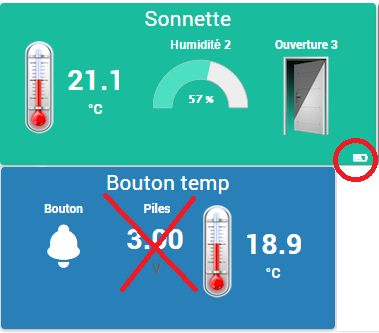
-
If I undefine: //#define BATT_SENSOR 199
it's working.
But your code still not 100% so we have to find why.
But... but, i think i'm making a mistake: yes i plan to use 3volts power. But, i don't want it as a sensor ! I wan't it as a battery level like the very first SensebenderMicro sketch. So... I have to undefine BATT_SENSOR ? And i will not have it set to 3Vcc=100% ?

Might you need to specify decimals if sending float as message. If you want to try, add a second argument with an integer number for decimals.
https://github.com/mysensors/Arduino/blob/1.5.3/libraries/MySensors/MyMessage.cpp#L212 -
void sendBattLevel(bool force) { if (force) lastBattery = -1; long vcc = readVcc(); if (vcc != lastBattery) { lastBattery = vcc; float siVolt = vcc / 1000; #ifdef BATT_SENSOR gw.send(msgBatt.set(siVolt, 2)); #endif // Calculate percentage vcc = min(vcc, 3000L); // vcc max is 3000 vcc = vcc - 1900; // subtract 1.9V from vcc, as this is the lowest voltage we will operate at long percent = vcc / 11.0; gw.sendBatteryLevel(percent); transmission_occured = true; } } -
The measurement method is not accurate at all. It relies on an internal reference that can vary in value between boards (I can't remember the accuracy of it at the moment)
If you don't want the battery voltage, then uncomment the #define for BATT_SENSOR in the top of the sketch, and move the float siVolt = vcc/1000; to be within the #ifdef BATT_SENSOR like:
#ifdef BATT_SENSOR float siVolt = vcc / 1000; gw.send(msgBatt.set(siVolt, 2)); #endifNow it should compile, and send battery percentage as the standard sensebender sketch.
-
I personaly think that it's quite good. When powered by FTDI, it found 3.00V.
And I have only add the "//" to BATT_SENSOR and it work good.
(you inverted the thing in the message just above).Thanks again for you help.
Now i work very good and very fast. I just have to check for adding an antenna to the controller. -
@Pierre-P How do you find the battery life please? I am planning to fit Sensebender with nrf24l01+ SMD and CR2032, but I wonder how long the battery is going to survive? Appreciate if depends on your sketch, but given one is conservative (i.e. no need to send temp/hum every 30-60 sec, but probably every 5-10mins or so), what's your estimate please?
-
I can't tell you for the moment, I haven't check the real voltage of the CR2032 at the beginning. I'll try to make two mesure between 30 days.
But my sketch is 1800000ms or 30min sleeping (if no-one press the button). Because it's a redundant information, my Jeedom controler have a meteo plugin who's working good. (i'll use it for the mini-night-temperature to have a message if there is glass on my car's windows).

